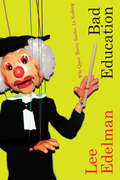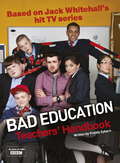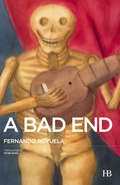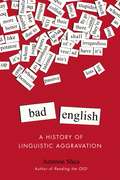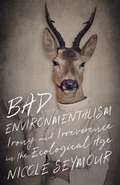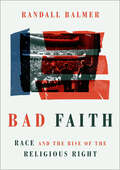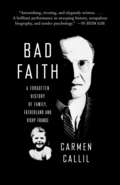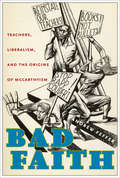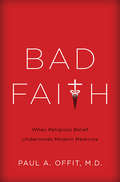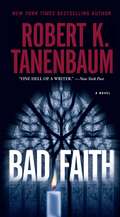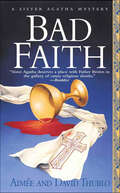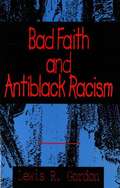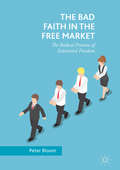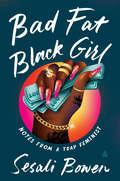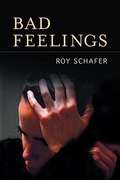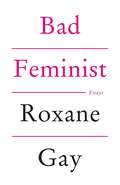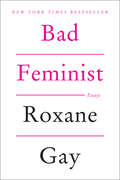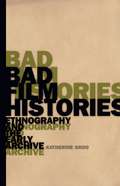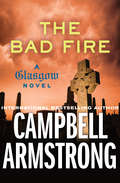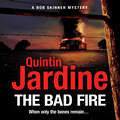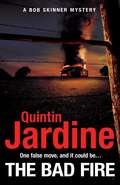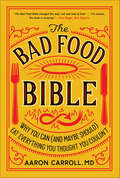- Table View
- List View
Bad Education: Why Queer Theory Teaches Us Nothing (Theory Q)
by Lee EdelmanLong awaited after No Future, and making queer theory controversial again, Lee Edelman’s Bad Education proposes a queerness without positive identity—a queerness understood as a figural name for the void, itself unnamable, around which the social order takes shape. Like Blackness, woman, incest, and sex, queerness, as Edelman explains it, designates the antagonism, the structuring negativity, preventing that order from achieving coherence. But when certain types of persons get read as literalizing queerness, the negation of their negativity can seem to resolve the social antagonism and totalize community. By translating the nothing of queerness into the something of “the queer,” the order of meaning defends against the senselessness that undoes it, thus mirroring, Edelman argues, education’s response to queerness: its sublimation of irony into the meaningfulness of a world. Putting queerness in relation to Lacan’s “ab-sens” and in dialogue with feminist and Afropessimist thought, Edelman reads works by Shakespeare, Jacobs, Almodóvar, Lemmons, and Haneke, among others, to show why queer theory’s engagement with queerness necessarily results in a bad education that is destined to teach us nothing.
Bad Education: Based on Jack Whitehall's hit TV series
by Bad EducationBad Education, written by and starring Jack Whitehall, follows Alfie Wickers the worst teacher to ever (dis)grace the British Education System, and a bigger kid than the pupils he teaches. Abbey Grove school is populated by some of the weirdest teachers you could ever meet: Fraser the hair-brained Headmaster who longs to be down with the kids, Miss Gulliver the biology teacher with a heart of gold but perhaps a dash too much openness and honesty, Miss Mollinson the happily swinging Head of Maths who won't let her hip replacement get in the way and Deputy Headmistress Miss Pickwell who displays all the charm and sensitivity of a Third Reich Dominatrix.Alfie's class is Form K, a bunch of misfits that have been written off by the rest of the school, but Alfie can't help but see a bit of himself in them. This is about a class of kids and their teacher's quest to get through life and get the best results with the minimum amount of effort possible. Sadly it's not an equation that always adds up. From a disastrous parents' evening to cringe-worthy sex-education lessons to life threatening self-defence classes to school elections full of dirty tricks and a school trip to see a rhino pig; Bad Education is school life as you've never seen it before. Bad Education: The Teacher's Handbook is filled with hilarious content from both the first and upcoming second series from pupil's report cards and the graffiti found in the staff toilets, to survival tips for school trips and the best ways to skive while teaching a lesson.
Bad Elements
by Ian Buruma'Ian Buruma is a man to read with interest, profit and care . . . He succeeds triumphantly in demonstrating that 'the Chinese . . . are not utterly unlike us, whoever we may be, and that freedom from torture, persecution, and spiritual and intellectual coercion is a common desire among all human beings and not merely a Western notion'. ' Chris Patten The TimesIn Bad Elements, Ian Buruma goes behind conventional news stories of economic growth, megacities and the Olympic Games, to see today's China though the stories of its dissidents: ordinary, brave people who oppose a regime that uses repression in the name of social order. He travels through the US, Singapore, Taiwan, Hong Kong and the People's Republic, to tell the stories of the rebels who dare to stand up to their rulers. From the exiles of Tiananmen to hidden Christians of rural China, he brings alive the human dimension to their struggles and reveals the world's most secretive superpower through the eyes of it opponents. Panoramic and intimate, disturbing and inspiring, Bad Elements is a profound meditation on the themes of national identity and political struggle. It is a relevant and timely account of China at street level. 'The tales of courage, sacrifice and integrity in Buruma's book are inspiring. He has done an excellent job of tracking down former Chinese dissidents, not only those from Tiananmen Square but other rebels who have suffered persecution in Taiwan and Singapore. ' Nick Rufford, Sunday Times'China is on the move, Ian Buruma is a leading writer on Asia, and his is an important book . . . A pungent book about the lack of democracy in Asia. ' George Walden, Sunday Telegraph'A judicious, sparkling readable book. ' Terry Eagleton, Irish Times
A Bad End
by Peter Bush Fernando Royuela"The burlesque echoes the greatest Spanish classics, from Quevedo to Camilo José Cela."--M. García Posada, El PaísA Bad End is the story of Goyito, a dwarf at the end of his life, who tells us, in a bitter and sarcastic way, the miserable reality of his lonely childhood, his macabre experiences as a circus clown, and his liaisons dangereuses in Madrid's underworld. Mischief, desire, death, ambition, revenge--the life of a rascal told in exuberant, exhilarating language. Winner of the Premio Ojo Crítico.Fernando Royuela is a Spanish lawyer and fiction writer who lives in Madrid, Spain.
Bad English
by Ammon SheaThe author of Reading the OED presents an eye-opening look at language "mistakes" and how they came to be accepted as correct--or not. English is a glorious mess of a language, cobbled together from a wide variety of sources and syntaxes, and changing over time with popular usage. Many of the words and usages we embrace as standard and correct today were at first considered slang, impolite, or just plain wrong. Whether you consider yourself a stickler, a nitpicker, or a rule-breaker in the know, Bad English is sure to enlighten, enrage, and perhaps even inspire. Filled with historic and contemporary examples, the book chronicles the long and entertaining history of language mistakes, and features some of our most common words and phrases, including: Decimate Hopefully Enormity That/which Enervate/energize Bemuse/amuse Literally/figuratively Ain't Irregardless Socialist OMG Stupider Lively, surprising, funny, and delightfully readable, this is a book that will settle arguments among word lovers--and it's sure to start a few, too.
Bad Environmentalism: Irony and Irreverence in the Ecological Age
by Nicole SeymourTraces a tradition of ironic and irreverent environmentalism, asking us to rethink the movement&’s reputation for gloom and doomActivists today strive to educate the public about climate change, but sociologists have found that the more we know about alarming issues, the less likely we are to act. Meanwhile, environmentalists have acquired a reputation as gloom-and-doom killjoys. Bad Environmentalism identifies contemporary texts that respond to these absurdities and ironies through absurdity and irony—as well as camp, frivolity, irreverence, perversity, and playfulness. Nicole Seymour develops the concept of &“bad environmentalism&”: cultural thought that employs dissident affects and sensibilities to reflect critically on our current moment and on mainstream environmental activism. From the television show Wildboyz to the short film series Green Porno, Seymour shows that this tradition of thought is widespread—spanning animation, documentary, fiction film, performance art, poetry, prose fiction, social media, and stand-up comedy since at least 1975. Seymour argues that these texts reject self-righteousness and sentimentality, undercutting public negativity toward activism and questioning basic environmentalist assumptions: that love and reverence are required for ethical relationships with the nonhuman and that knowledge is key to addressing problems like climate change.Funny and original, Bad Environmentalism champions the practice of alternative green politics. From drag performance to Indigenous comedy, Seymour expands our understanding of how environmental art and activism can be pleasurable, even in a time of undeniable crisis.
Bad Faith: Race and the Rise of the Religious Right
by Randall BalmerA surprising and disturbing origin story There is a commonly accepted story about the rise of the Religious Right in the United States. It goes like this: with righteous fury, American evangelicals entered the political arena as a unified front to fight the legality of abortion after the Supreme Court&’s 1973 Roe v. Wade decision. The problem is this story simply isn&’t true. Largely ambivalent about abortion until the late 1970s, evangelical leaders were first mobilized not by Roe v. Wade but by Green v. Connally, a lesser-known court decision in 1971 that threatened the tax-exempt status of racially discriminatory institutions—of which there were several in the world of Christian education at the time. When the most notorious of these schools, Bob Jones University, had its tax-exempt status revoked in 1976, evangelicalism was galvanized as a political force and brought into the fold of the Republican Party. Only later, when a more palatable issue was needed to cover for what was becoming an increasingly unpopular position following the civil rights era, was the moral crusade against abortion made the central issue of the movement now known as the Religious Right. In this greatly expanded argument from his 2014 Politico article &“The Real Origins of the Religious Right,&” Randall Balmer guides the reader along the convoluted historical trajectory that began with American evangelicalism as a progressive force opposed to slavery, then later an isolated apolitical movement in the mid-twentieth century, all the way through the 2016 election in which 81 percent of white evangelicals coalesced around Donald Trump for president. The pivotal point, Balmer shows, was the period in the late 1970s when American evangelicals turned against Jimmy Carter—despite his being one of their own, a professed &“born-again&” Christian—in favor of the Republican Party, which found it could win their loyalty through the espousal of a single issue. With the implications of this alliance still unfolding, Balmer&’s account uncovers the roots of evangelical watchwords like &“religious freedom&” and &“family values&” while getting to the truth of how this movement began—explaining, in part, what it has become.
Bad Faith: A Forgotten History of Family and Fatherland
by Carmen CallilThis brilliant book tells the story of one of history's most despicable villains and conmen -- Louis Darquier de Pellepoix, Nazi collaborator and 'Commissioner for Jewish Affairs', who managed the Vichy government's dirty work, 'controlling' its Jewish population. Born into an established, politically moderate family, Louis Darquier ('de Pellepoix' was a later affectation) proceeded from modest beginnings to dissemble his way to power, continually reinventing himself in conformity with an obsession with racial purity and the latent anti-Semitism of the French Catholic Church. He was the ultimate chancer: always broke, always desperate for attention, social cachet, women and drink, he became 'one of the few men to put on weight during the Second World War', and after it was over he decamped to Spain, never to be brought to justice for having sent thousands of Jews, men, women and children, to the camps. Early on in his career he married the alcoholic Myrtle Jones from Tasmania, equally practised in the arts of fantasy and deception, and together they had a child, Anne Darquier, whom they promptly abandoned to grow up in England under an oppressive mantle of silence. Her tragic story of honourable but exhausting ambition is woven through the narrative. In Carmen Callil's masterful and harrowing account, Darquier's ascent to power during the years leading up to the Second World War comes to mirror the rise of French anti-Semitism and the role it played in the horrors that were to follow. It is a portrait of a society as fragmented and desperate as any before the war, trading miserable second-rate philosophies in search of meaning and power, and of how the people of Vichy turned a blind eye to the shameful things being done under their noses.
Bad Faith: Teachers, Liberalism, and the Origins of McCarthyism
by Andrew FefferIn late summer 1940, as war spread across Europe and as the nation pulled itself out of the Great Depression, an anticommunist hysteria convulsed New York City. Targeting the city’s municipal colleges and public schools, the New York state legislature’s Rapp-Coudert investigation dragged hundreds of suspects before public and private tribunals to root out a perceived communist conspiracy to hijack the city’s teachers unions, subvert public education, and indoctrinate the nation’s youth. Drawing on the vast archive of Rapp-Coudert records, Bad Faith provides the first full history of this witch-hunt, which lasted from August 1940 to March 1942. Anticipating McCarthyism and making it possible, the episode would have repercussions for decades to come. In recapturing this moment in the history of prewar anticommunism, Bad Faith challenges assumptions about the origins of McCarthyism, the liberal political tradition, and the role of anticommunism in modern American life. With roots in the city’s political culture, Rapp-Coudert enjoyed the support of not only conservatives but also key liberal reformers and intellectuals who, well before the Cold War raised threats to national security, joined in accusing communists of “bad faith” and branded them enemies of American democracy. Exploring fundamental schisms between liberals and communists, Bad Faith uncovers a dark, “countersubversive” side of liberalism, which involved charges of misrepresentation, lying, and deception, and led many liberals to argue that the communist left should be excluded from American educational institutions and political life. This study of the Rapp-Coudert inquisition raises difficult questions about the good faith of the many liberals willing to aid and endorse the emerging Red scare, as they sacrificed principles of open debate and academic freedom in the interest of achieving what they believed would be effective modern government based on bipartisanship and a new and seemingly permanent economic prosperity.
Bad Faith: When Religious Belief Undermines Modern Medicine
by Paul A. OffitIn recent years, there have been major outbreaks of whooping cough among children in California, mumps in New York, and measles in Ohio’s Amish country--despite the fact that these are all vaccine-preventable diseases. Although America is the most medically advanced place in the world, many people disregard modern medicine in favor of using their faith to fight life threatening illnesses. Christian Scientists pray for healing instead of going to the doctor, Jehovah’s Witnesses refuse blood transfusions, and ultra-Orthodox Jewish mohels spread herpes by using a primitive ritual to clean the wound. Tragically, children suffer and die every year from treatable diseases, and in most states it is legal for parents to deny their children care for religious reasons. In twenty-first century America, how could this be happening? In Bad Faith, acclaimed physician and author Dr. Paul Offit gives readers a never-before-seen look into the minds of those who choose to medically martyr themselves, or their children, in the name of religion. Offit chronicles the stories of these faithful and their children, whose devastating experiences highlight the tangled relationship between religion and medicine in America. Religious or not, this issue reaches everyone--whether you are seeking treatment at a Catholic hospital or trying to keep your kids safe from diseases spread by their unvaccinated peers. Replete with vivid storytelling and complex, compelling characters, Bad Faith makes a strenuous case that denying medicine to children in the name of religion isn’t just unwise and immoral, but a rejection of the very best aspects of what belief itself has to offer.
Bad Faith (A Butch Karp-Marlene Ciampi Thriller #24)
by Robert K. TanenbaumA parent&’s worst nightmare sets the stage for the exhilarating new thriller in Robert K. Tanenbaum&’s New York Times bestselling Butch Karp series.New York District Attorney Butch Karp has no qualms about putting David and Nonie Ellis on trial following the excruciating death of their young son, Micah. To him, the case is cut-and-dried—reckless manslaughter. Helpless ten-year-old Micah counted on his parents to protect him from the effects of a rare but treatable cancer. Instead, the Ellis family relied solely on prayer and the guidance of snake-oil salesman Reverend C. G. Westlund, of the End of Days Reformation Church of Jesus Christ Resurrected, to save him. Westlund and his zealous followers set up camp outside the DA&’s office, angrily protesting the indictment of their &“brother&” and &“sister,&” but the charismatic leader&’s true objective is to create a diversion from an alarming fraud. He coerced Nonie Ellis into signing an insurance policy that listed himself and the church as beneficiaries in the event of Micah&’s death, but he needs the Ellises to be exonerated to get the payout. When David Ellis discovers the deception, no amount of faith can save him from his gruesome fate. Amid the firestorm of controversy surrounding the case, Karp&’s wife, private investigator Marlene Ciampi, heads to Memphis to uncover Westlund&’s past. The evidence she finds is enough to blow the top off the con man&’s scheme—if she doesn&’t get herself blown away in the process. Back in Manhattan, meanwhile, Karp is confronted by a deadly nemesis from the past who has explosive plans of her own. The edge-of-your-seat action comes to a head at the annual Halloween parade when a merciless struggle between good and evil metes out its own fatal form of justice.
Bad Faith: A Sister Agatha Mystery (Sister Agatha Mysteries #1)
by David Thurlo Aimée ThurloOnce she was Professor Mary Naughton, investigative reporter, teacher, and free spirit. Now she is Sister Agatha of Our Lady of Hope, a cloistered, financially-struggling monastery in New Mexico. As an extern-a nun who handles her order's dealings with the outside world-she is used to having her faith and newly-acquired patience tested. But when popular chaplain Father Anselm is poisoned to death in the middle of Mass, Sister Agatha has to bring all her worldly skepticism and savvy instincts to uncover the truth before scandal and unjust suspicion destroy Our Lady of Hope's future. She's up against a hostile local sheriff, an ex-lover who's never forgiven her for 'abandoning' their life together. She's got no shortage of suspects-with-secrets outside-and inside-the monastery. And she'll have to race the clock to stop one remorseless murderer before there's more hell to pay...
Bad Faith and Antiblack Racism
by Lewis R. GordonLewis Gordon presents the first detailed existential phenomenological investigation of antiblack racism as a form of Sartrean bad faith. Bad faith, the attitude in which human beings attempt to evade freedom and responsibility, is treated as a constant possibility of human existence. Antiblack racism, the attitude and practice that involve the construction of black people as fundamentally inferior and subhuman, is examined as an effort to evade the responsibilities of a human and humane world. Gordon argues that the concept of bad faith militates against any human science that is built upon a theory of human nature and as such offers an analysis of antiblack racism that stands as a challenge to our ordinary assumptions of what it means to be human.
The Bad Faith in the Free Market: The Radical Promise Of Existential Freedom
by Peter BloomInnovatively combining existentialist philosophy with cutting edge post-structuralist and psychoanalytic perspectives, this book boldly reconsiders market freedom. Bloom argues that present day capitalism has robbed us of our individual and collective ability to imagine and implement alternative and more progressive economic and social systems; it has deprived us of our radical freedom to choose how we live and what we can become.Since the Great Recession, capitalism has been increasingly blamed for rising inequality and feelings of mass social and political alienation. In place of a deeper liberty, the free market offers subjects the opportunity to continually reinvest their personal and shared hopes within its dogmatic ideology and policies. This embrace helps to temporarily alleviate growing feelings of anxiety and insecurity at the expense of our fundamental human agency. What has become abundantly clear is that the free market is anything but free.Here, Bloom exposes our present day bad faith in the free market and how we can break free from it.
Bad Fat Black Girl: Notes from a Trap Feminist
by Sesali BowenFrom funny and fearless entertainment journalist Sesali Bowen, Bad Fat Black Girl combines rule-breaking feminist theory, witty and insightful personal memoir, and cutting cultural analysis for an unforgettable, genre-defining debut. <p><p> Growing up on the south side of Chicago, Sesali Bowen learned early on how to hustle, stay on her toes, and champion other Black women and femmes as she navigated Blackness, queerness, fatness, friendship, poverty, sex work, and self-love. Her love of trap music led her to the top of hip-hop journalism, profiling game-changing artists like Megan Thee Stallion, Lizzo, and Janelle Monae. But despite all the beauty, complexity, and general badassery she saw, Bowen found none of that nuance represented in mainstream feminism. Thus, she coined Trap Feminism, a contemporary framework that interrogates where feminism meets today's hip-hop. <p><p> Bad Fat Black Girl offers a new, inclusive feminism for the modern world. Weaving together searing personal essay and cultural commentary, Bowen interrogates sexism, fatphobia, and capitalism all within the context of race and hip-hop. In the process, she continues a Black feminist legacy of unmatched sheer determination and creative resilience. <p><p> Bad bitches: this one’s for you.
Bad Feelings: Selected Psychoanalytic Essays
by Roy SchaferBad feelings are ubiquitous to human experience. Everyone deals with grief, envy, disappointment, dejection, humiliation, mortification, and anxiety. However, when we consciously push troubling feelings aside and then avoid them, we should be under no illusions that such repression empowers us to lead untroubled lives. The price that we pay, simply, is feeling less alive. Our attempts to avoid feeling pain manifest themselves in feelings of disconnection and numbness. To make matters worse, bad feelings often bring moralistic self-condemnation that arises unconsciously or even consciously: "It is bad of you to feel that way!" "You're being a nuisance to worry about that!" Many families even elevate mental health to the status of an Eleventh Commandment. They believe that when they have negative feelings and express them, this constitutes behavioral problems. When they begin to feel anxious, glum, or ashamed, they are stricken with guilt or fears of punishment. Their goal is perfect adjustment, and their taboo is the secret forbidden pleasure hidden by pain. This book demonstrates how psychoanalytic understanding can reduce the painfulness of negative feelings and increase our tolerance for emotional pain. This work can enable freedom from frightening, vengeful, and guilt-ridden fantasies, decrease reliance on passive and masochistic ways of being, and increase our ability to take pleasure in the body, to enjoy relations with others, the use of one's assets, and to take pride in one's achievements. These changes outweigh the emotional pains that we inevitably suffer by living, and they help us feel that it is worth our while to enjoy a lively existence.
Bad Feelings: Selected Psychoanalytic Essays
by Roy SchaferEveryone experiences "bad" feelings - guilt, shame, humiliation, envy and more. Yet despite the fact that such emotions are a common occurrence, these painful feelings are often labelled as wrong, a moralistic determination that can complicate existing problems in the individual's emotional life. Through careful research and assessment of psychoanalytical methods, this book offers a new understanding of how painful emotional states can find relief through the talking cure.
Bad Feminist: Essays
by Roxane Gay'Pink is my favourite colour. I used to say my favourite colour was black to be cool, but it is pink – all shades of pink. If I have an accessory, it is probably pink. I read Vogue, and I’m not doing it ironically, though it might seem that way. I once live-tweeted the September issue.'In these funny and insightful essays, Roxane Gay takes us through the journey of her evolution as a woman (Sweet Valley High) of colour (The Help) while also taking readers on a ride through culture of the last few years (Girls, Django in Chains) and commenting on the state of feminism today (abortion, Chris Brown). The portrait that emerges is not only one of an incredibly insightful woman continually growing to understand herself and our society, but also one of our culture.Bad Feminist is a sharp, funny and sincere look at the ways in which the culture we consume becomes who we are, and an inspiring call-to-arms of all the ways we still need to do better.
Bad Feminist: Essays
by Roxane Gay“Roxane Gay is so great at weaving the intimate and personal with what is most bewildering and upsetting at this moment in culture. She is always looking, always thinking, always passionate, always careful, always right there.” — Sheila Heti, author of How Should a Person Be?A New York Times BestsellerBest Book of the Year: NPR • Boston Globe • Newsweek • Time Out New York • Oprah.com • Miami Herald • Book Riot • Buzz Feed • Globe and Mail (Toronto) • The Root • Shelf AwarenessA collection of essays spanning politics, criticism, and feminism from one of the most-watched cultural observers of her generationIn these funny and insightful essays, Gay takes us through the journey of her evolution as a woman (Sweet Valley High) of color (The Help) while also taking readers on a ride through culture of the last few years (Girls, Django in Chains) and commenting on the state of feminism today (abortion, Chris Brown). The portrait that emerges is not only one of an incredibly insightful woman continually growing to understand herself and our society, but also one of our culture.Bad Feminist is a sharp, funny, and spot-on look at the ways in which the culture we consume becomes who we are, and an inspiring call-to-arms of all the ways we still need to do better, coming from one of our most interesting and important cultural critics.
Bad Film Histories: Ethnography and the Early Archive
by Katherine GrooA daring, deep investigation into ethnographic cinema that challenges standard ways of writing film history and breaks important new ground in understanding archives Bad Film Histories is a vital work that unsettles the authority of the archive. Katherine Groo daringly takes readers to the margins of the film record, addressing the undertheorization of film history and offering a rigorous corrective. Taking ethnographic cinema as a crucial case study, Groo challenges standard ways of thinking and writing about film history and questions widespread assumptions about what film artifacts are and what makes them meaningful. Rather than filling holes, Groo endeavors to understand the imprecisions and absences that define film history and its archives. Bad Film Histories draws on numerous works of ethnographic cinema, from Edward S. Curtis&’s In the Land of the Head Hunters, to a Citroën-sponsored &“croisière&” across Africa, to the extensive archives of the Maison Lumière and the Musée Albert-Kahn, to dozens of expedition films from the 1910s and 1920s. The project is deeply grounded in poststructural approaches to history, and throughout Groo draws on these frameworks to offer innovative and accessible readings that explain ethnographic cinema&’s destabilizing energies.As Groo describes, ethnographic works are mostly untitled, unauthored, seemingly infinite in number, and largely unrestored even in their digital afterlives. Her examination of ethnographic cinema provides necessary new thought for both film scholars and those who are thrilled by cinema&’s boundless possibilities. In so doing, she boldly reexamines what early ethnographic cinema is and how these films produce meaning, challenging the foundations of film history and prevailing approaches to the archive.
The Bad Fire (The Glasgow Novels #1)
by Campbell ArmstrongA police detective returns to Glasgow to investigate his estranged father&’s death in international bestselling author Campbell Armstrong&’s atmospheric, page-turning thriller Detective Eddie Mallon is coming home to Glasgow for the funeral of his father, whom he barely knew. Decades ago, the Mallon family split down the middle, and Eddie went to America with his mother while his sister stayed with their father, Jackie, a charming, mercurial, violent man. Now Jackie has been murdered and the investigators assigned to his case don&’t seem particularly interested in dealing with Eddie&’s concerns, or the clues he uncovers. Eddie has no choice but to conduct his own investigation, which takes him into the shadowy history of his father&’s past and present and into something bigger and more disturbing than one man&’s death. Campbell Armstrong&’s suspenseful writing brings the foggy alleys of Glasgow to life, transforming the mysterious city into a character in and of itself.The Bad Fire is the 1st book in the Glasgow Novels, but you may enjoy reading the series in any order.
The Bad Fire: A shocking murder case brings danger too close to home for ex-cop Bob Skinner in this gripping Scottish crime thriller (Bob Skinner #31)
by Quintin JardineThe gritty new mystery in Quintin Jardine's bestselling Bob Skinner series, set in Edinburgh and the Scottish countryside; not to be missed by readers of Ian Rankin and Peter May. Nine years ago, divorcee Marcia Brown took her own life. A pillar of the community, she had been accused of theft, and it's assumed that she was unable to live with the shame. Now her former husband wants the case reopened. Marcia was framed, he says, to prevent her exposing a scandal. He wants justice for Marcia. And Alex Skinner, Solicitor Advocate, and daughter of retired Chief Constable Sir Robert Skinner, has taken on the brief, aided by her investigator Carrie McDaniels. When tragedy strikes and his daughter comes under threat, Skinner steps in. His quarry is about to discover that the road to hell is marked by bad intentions . . .What readers are saying about Quintin Jardine's gripping mysteries: 'I would recommend anyone new to the series to give yourself a treat and read them all!!''I have given this book five stars because of the ingenious plot, the excellence of the narrative and, after quite a number of years, Quintin Jardine is still producing superb crime fiction''A fantastic gripping read and I didn't want to put it down''As always Mr Jardine had me hooked from the first chapter to the very end'
The Bad Fire: A shocking murder case brings danger too close to home for ex-cop Bob Skinner in this gripping Scottish crime thriller (Bob Skinner #31)
by Quintin Jardine'Scottish crime-writing at its finest, with a healthy dose of plot twists and turns, bodies and plenty of brutality' SunThe gritty new mystery in Quintin Jardine's bestselling Bob Skinner series, set in Edinburgh and the Scottish countryside; not to be missed by readers of Ian Rankin and Peter May. Nine years ago, divorcee Marcia Brown took her own life. A pillar of the community, she had been accused of theft, and it's assumed that she was unable to live with the shame. Now her former husband wants the case reopened. Marcia was framed, he says, to prevent her exposing a scandal. He wants justice for Marcia. And Alex Skinner, Solicitor Advocate, and daughter of retired Chief Constable Sir Robert Skinner, has taken on the brief, aided by her investigator Carrie McDaniels. When tragedy strikes and his daughter comes under threat, Skinner steps in. His quarry is about to discover that the road to hell is marked by bad intentions . . .'Skinner's lost none of his hard edge when he steps up to the plate after his daughter Alex, a legal eagle, is in trouble when a cold murder case explodes red hot and dangerous. Someone's going to meet his match in Skinner' Peterborough Evening Telegraph'Well-constructed . . . intriguing' Scotland on SundayWhat readers are saying about Quintin Jardine's gripping mysteries: 'I would recommend anyone new to the series to give yourself a treat and read them all!!''I have given this book five stars because of the ingenious plot, the excellence of the narrative and, after quite a number of years, Quintin Jardine is still producing superb crime fiction''A fantastic gripping read and I didn't want to put it down''As always Mr Jardine had me hooked from the first chapter to the very end'
The Bad Fire (Bob Skinner series, Book 31): A shocking murder case brings danger too close to home for ex-cop Bob Skinner in this gripping Scottish crime thriller
by Quintin Jardine'Scottish crime-writing at its finest, with a healthy dose of plot twists and turns, bodies and plenty of brutality' SunThe gritty new mystery in Quintin Jardine's bestselling Bob Skinner series, set in Edinburgh and the Scottish countryside; not to be missed by readers of Ian Rankin and Peter May. Nine years ago, divorcee Marcia Brown took her own life. A pillar of the community, she had been accused of theft, and it's assumed that she was unable to live with the shame. Now her former husband wants the case reopened. Marcia was framed, he says, to prevent her exposing a scandal. He wants justice for Marcia. And Alex Skinner, Solicitor Advocate, and daughter of retired Chief Constable Sir Robert Skinner, has taken on the brief, aided by her investigator Carrie McDaniels. When tragedy strikes and his daughter comes under threat, Skinner steps in. His quarry is about to discover that the road to hell is marked by bad intentions . . .'Skinner's lost none of his hard edge when he steps up to the plate after his daughter Alex, a legal eagle, is in trouble when a cold murder case explodes red hot and dangerous. Someone's going to meet his match in Skinner' Peterborough Evening Telegraph'Well-constructed . . . intriguing' Scotland on SundayWhat readers are saying about Quintin Jardine's gripping mysteries: 'I would recommend anyone new to the series to give yourself a treat and read them all!!''I have given this book five stars because of the ingenious plot, the excellence of the narrative and, after quite a number of years, Quintin Jardine is still producing superb crime fiction''A fantastic gripping read and I didn't want to put it down''As always Mr Jardine had me hooked from the first chapter to the very end'
The Bad Food Bible: Why You Can (and Maybe Should) Eat Everything You Thought You Couldn't
by Aaron CarrollPhysician and popular New York Times contributor Aaron Carroll mines the latest evidence to show that many &“bad&” ingredients actually aren&’t unhealthy, and in some cases are essential to our well-being.Advice about food can be confusing. There&’s usually only one thing experts can agree on: some ingredients—often the most enjoyable ones—are bad for you, full stop. But as Aaron Carroll explains, if we stop consuming some of our most demonized foods, it may actually hurt us. Examining troves of studies on dietary health, Carroll separates hard truths from hype, showing that you can Eat red meat several times a week. Its effects are negligible for most people, and actually positive if you&’re 65 or older.Have a drink or two a day. In moderation, alcohol may protect you against cardiovascular disease without much risk.Enjoy a gluten-loaded bagel from time to time. It has less fat and sugar, fewer calories, and more fiber than a gluten-free one.Eat more salt. If your blood pressure is normal, you may be getting too little sodium, not too much. Full of counterintuitive, deeply researched lessons about food we hate to love, The Bad Food Bible is for anyone who wants to forge eating habits that are sensible, sustainable, and occasionally indulgent.
